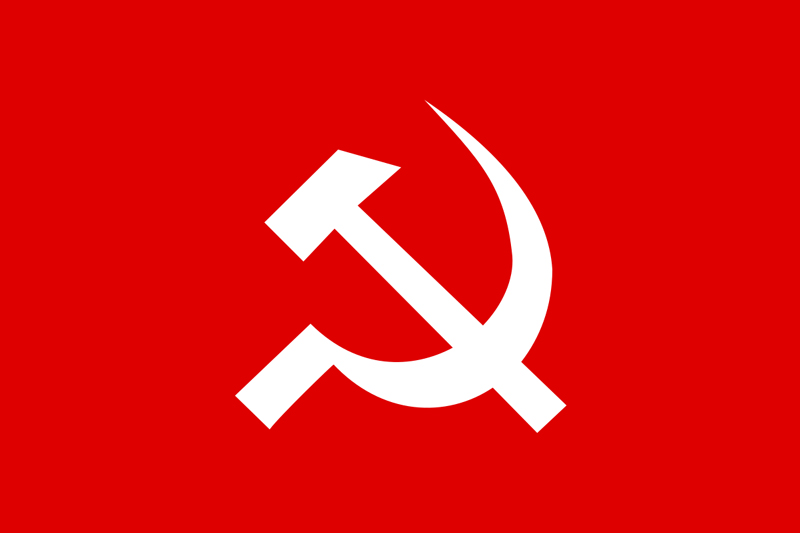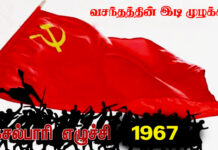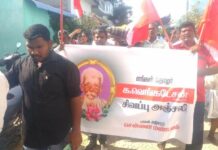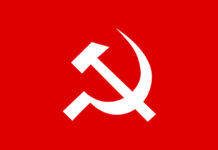 Date : 04-07-2022
Date : 04-07-2022
Press Release
A few remarks on the attitude of the proletarian party in paying Salute and Tribute
Dear Comrades! Friends!
Ganesan alias Anbazhagan, 74 year old, who had been the former Secretary for nearly 40 years in our organization – State Organising Committee, Communist Party of India (Marxist-Leninist) – passed away on the afternoon of 28-06-2022.
Anbazhagan, after graduating with a master’s degree in Engineering, embraced Naxalbari revolutionary politics in the early 1970s and dedicated himself as a full-timer with the ideal of liberating the country and the people. At that time, CPI (M-L) was split due to left opportunism and brutal repression of the State. He played a significant role in the formation and development of the State Organising Committee during its emergence in 1977 in the midst of the split, proposing an alternative way – the mass line. Later in 1981, in the third plenum of the SOC, he took charge as the fourth Secretary of our organisation.
In the tenth plenum of our organisation in 2021, he was removed from the responsibility due to his political-ideological-organisational mistakes. He, being a full-timer in our organisation, could not accept the deprivation of his responsibility and authority and hence plunged into right-wing opportunistic – neo-anarchist ideology and engaged in subversive activities and factionalism. As a result, he split with his supporters and left our organisation at the end of May 2022, functioning as a separate group. As his divisive sectarian disruptive activities were exposed, he and his supporters, who supported his sectarian divisive activities, were expelled officially from our organisation by the SOC.
With regard to this, we issued a statement dated 13-06-2022 on behalf of the SOC – “The power-hungry conspiratorial mob has been kicked out! Unity and freshness permeate throughout the organisation!”
Tribute to Opportunists
The former Secretary, who was earlier unwell due to old age, was admitted to the hospital and passed away on 28-06-2022.
In this case,
“Comrade, who had lived with ordinary people until 2010, started working in urban areas and stayed with the families of comrades with petty-bourgeois lifestyle due to organisational work, and as a result of which anti-proletarian qualities began to take root in his thoughts.
It should be considered as a negative experience that the comrade, who fought fiercely for a proper communist life for others, adopted a double-standard approach of liberally considering himself and some comrades close to him. In the end, this isolated him from the ranks and became the subject of severe criticism and he was blamed for the party split.
In his final years he was not only subjected to anti-proletarian qualities, but also became bureaucratic, and exhibited anti-Marxist-Leninist qualities such as being anti-democratic and disruptive. Despite such colossal mistakes, it is not possible to assess that he lived and died a communist for the rest of his life. However, let’s take the best qualities we have learned from Comrade Ganesan, as our mentors taught us. According to the dialectical approach, the evaluation of a person by considering the works, dedication and sacrifices he has made in the past, and the rights and wrongs he is doing in practice in the present will enable us to predict what he will be like in the future!”
– This obituary, dated 29-06-2022 and entitled “Comrade Ganesan, former Secretary of the State Organising Committee, passed away! Our Tribute to Comrade Ganesan!” was published in the name of SOC by the subversive–neo-liquidationist group that has left our organisation.
The supporters of the former Secretary, who suddenly crowned themselves as SOC, issued the following statement: “The red sun, which blazed to defend the M-L base of the party till the end, fought against the liquidationist mob that ran away and then the apolitical, non-ideological and cultureless factions that took over the leadership of the party and destroyed the party itself, has extinguished today.
His loss is an irreconcilable not only to our organisation, but also to the entire proletarian movement in India and the Indian revolution. We will travel on the path reddened with his blood and defeat the liquidators, non-ideological, cultureless factions, traitors and conspirators!
Let’s uphold the party’s Naxalbari tradition and our strategy and tactics centralized on mass line!”
The supporters of the former secretary, who suddenly declared themselves as the ‘State Organization Committee’, issued this statement.
Apart from these, individuals who left or had been expelled from our organization, ex-Naxalbaris, revolutionary chatters on Facebook – many paid tributes to the former secretary. Others wrote condolences.
However, our organization did not issue any statement or news regarding the demise of the former secretary. Regarding this,
“It is wrong to remain silent without issuing any statement. This is not a communist culture, this is orthodoxy and is exhibition of perverse feudal prestige”, some people (who are not part of any organization) are hurling slanders on our organization. They are defaming and ridiculing the current leadership of the SOC by saying that they are amateurs and lack any revolutionary experience. This remark – “No matter what the contradictions are, we should pay tribute to the demised Naxalbari leaders” – has gained influence today. We are being threatened that if we do not join such a mainstream, then we will be isolated.
“Despite thousands of political-ideological differences, he worked as a full-timer for about 45 years. He has been a leader for nearly 40 years. He dedicated his life for the liberation of people. It would be appropriate at this time to publish an obituary message and remember such a person, and also evaluate his good and bad deeds. Like summarizing the positive and negative experiences of the leaders of other movements at the time of their death, this should also be done”.
“In the current situation, where the former secretary’s demise has become a hot topic of discussion on Facebook, it would be appropriate to express your position”, some said. They argue that this is what the subversive–neo liquidators have done.
But, it is not in the history of the international revolutionary communist movement to pay tribute or salute to those who have defected or been expelled from the party; Not in the history of our organisation too.
Some facts from the Indian, International revolutionary communist movements
☀ Plekhanov, who became an important Marxist in the Second Communist International, founded the first Marxist group in Russia in 1863 under the name of “Emancipation of Labour”. This organization was instrumental in the spreading of Marxism in Russia. Plekhanov was the founder of the Russian Social Democratic Workers’ Party. He was hailed as the “Father of Russian Marxism”. He presented a programme for the creation of a Social Democratic Workers’ Party in Russia. Plekhanov defeated Narodism by ideologically combating the Narodniks who engaged in terrorist activity against the tyranny of the Tsarist regime and diverted the Russian proletarian revolutionary movement, and rejected the most important duty of forming a workers-peasants party and mobilizing the masses systematically.
Plekhanov later joined the Mensheviks and opposed the Bolsheviks led by Lenin and got degenerated ideologically. The Russian Bolshevik Party paid no tribute to Plekhanov when he died.
☀ Trotsky played a key role in the Russian Socialist Revolution. He was the People’s Commissar for Foreign Affairs of the Soviet Government. From 1918 to 1925 he was the People’s Commissar for Military and Naval Affairs of the then Soviet Socialist Government.
Later he degenerated politically and ideologically and became a traitor to the proletariat and engaged in conspiracies against the Soviet government. After this was exposed, in 1929 he was expelled by the Politburo of the Bolshevik Party. After that he lived in exile and opposed Comrade Stalin and the Soviet Socialist Government. He formed the Fourth International in 1938 to oppose the Third Communist International, which had been built by Comrades Lenin and Stalin. He was killed in Mexico City in 1940. When he died, a proletarian State prevailed in Soviet Russia. However, neither the State nor the party paid any tribute to him.
☀ Chen Duxiu was one of the founders of the Communist Party of China and served as its first General Secretary. He played a key role in the revolution that overthrew the Qing monarchy and the May 4th movement. But he was expelled from the party in 1929 due to his right-wing opportunistic methods. Later, he became the leader of the Trotskyist movement for a while. He became a right-wing opportunist and betrayed the revolution. He died in 1942 and the Communist Party of China paid no tribute to him.
☀ Liu Shaoqi was a key figure in the Chinese Revolution. After the victory of the Chinese Revolution, he served as the Chairman of the Standing Committee of the National People’s Congress and Vice Chairman of the Communist Party of China. He was depicted as next in rank to Comrade Mao. He wrote “How to be a good Communist”, a training book for communists. However, he later fell victim to capitalist ideology and embarked on nefarious plots to take over the Communist Party of China and the regime.
Degenerated into a capitalist roadie, he was exposed during the Cultural Revolution launched by Comrade Mao in 1966. The Cultural Revolution defined him as “the headquarters of capitalism”. When he died in 1969, the Communist Party of China paid no tribute to him.
☀ MN Roy was the one who made the initial efforts to start the first Communist Party in India. He built a communist group in Tashkent in 1921 and trained many people as communists. MN Roy was also prominent among those who collaborated with Lenin in the Third International. He was put on the executive committee of the Communist International and was appointed as Russia’s aide to China.
Later, due to his wrong ideology and wrong guidelines, he was expelled from the Comintern. Later, he abandoned proletarian ideology and fell victim to bourgeois humanist ideology. When he died, no communist party, not even right and left pseudo-communist parties paid tribute to him though he laid the foundation for the formation of Communist Party in India.
☀ Following the Naxalbari uprising, the Communist Party of India (M-L) was formed. It was later split and retracted due to leftist opportunism and State repression. Kondapalli Seetharamaiah split from the then Central Organising Committee (COC), which was formed in Andhra Pradesh as a part of the Naxalbari movement, and formed People’s War. He was one of the founding leaders of the People’s War Group. However, he was expelled from the People’s War Group he formed in 1991. Thereafter he operated as a separate unit with his supporters. In 1993 he was arrested and imprisoned.
A few years later he was released on humanitarian grounds due to old age. He died on April 12, 2002, being cared for by his granddaughters. Today’s Maoist Party, the People’s War Group of the day, paid no tribute to his demise.
☀ Vinod Mishra abandoned the Naxalbari revolutionary tradition and also the basic principles of CPI (M-L). He degraded the party into yet another neo-revisionist party like the CPI (M). This is why when Vinod Mishra, the founder of the CPI (M-L) (Liberation) died, no revolutionary M-L group, including our organization, paid tribute.
☀ In Tamil Nadu, before the formation of the SOC, the then Central Committee member AMK became the Tamil Nadu Secretary of the united CPI (M-L) after the martyrdom of the party’s Tamil Nadu Secretary Comrade Appu. After his arrest, the party became dysfunctional, divided and retracted due to problems caused by left opportunistic methods and brutal repression by the State.
In this situation, the report of the West Regional Committee against the left opportunist method was published, and subsequently the Adhoc Organising Committee was formed which united the revolutionaries, and subsequently the State Organising Committee was established. Kani was elected as the Secretary in the first plenum, which was held between 31st December 1976 and 1st January 1977.
Later Kani espoused the neo-revisionist ideology and left the organization in 1979 along with the other abandoners who split the organization. For a while, he worked with this mob under TNOC (Tamil Nadu Organising Committee). Later, he was kicked out by them and got immersed in his personal life. He occasionally indulged in revolutionary chats with his acquaintances and later died of old age. Our organization did not pay tribute to the first secretary of SOC; TNOC also did not pay tribute.
Similarly, Karuna Manokaran, who was the second secretary of the SOC, later degenerated politically and ideologically, split the organization along with the abandoners, littered with them for a while, and then joined the Marxia Periyariya Pothuvudamai Katchi. When he died, our organization paid no tribute to him just because he was the second Secretary. TNOC also did not pay any tribute.
AMK, who was the second secretary of the united CPI (M-L) in Tamil Nadu, upheld the politics of liquidationism. He passed away due to old age on November 25, 2018. At that time, Ganesan, who is now deceased, was the secretary of the SOC. However, the SOC, led by him did not pay tribute to AMK or issue a statement. Arunachalam, who worked as a full-timer in our organization and then left our organization citing political and ideological reasons, had died in January 2022. We did not pay tribute or issue a statement in the same manner as above.
It is on this basis that our organization did not pay tribute, salute or issue a statement on the death of the former secretary. To do so is a blatant opportunism.
Manifestations of Ideological Degeneration
The former secretary was denounced till yesterday as a bureaucrat, a right opportunist and an anarchist. It will be hypocritical to pay tribute to him now.
Paying tribute to those who formed factions within the party, engaged in conspiracies and split the organization into separate groups is a manifestation of ideological degeneration. Such a person cannot be considered as our comrade and tribute cannot be paid to him.
Ideological struggle does not take place only as an intellectual debate at some higher level. It manifests itself in the day-to-day life of the organization and in day-to-day practice. It would be wrong to consider a person who abandoned proletarian ideology as a revolutionary. It is an expression of ideological weakness.
Fighting against this kind of ideology and oscillation is the real ideological struggle against right opportunism and neo-anarchism, as decided at the 10th plenum of our organization and then at the special meeting in April 2022.
But revisionists, opportunists and bourgeois liberals of all colours have been striving hard to induct anti-proletarian ideologies and cultures into the party. They have been trying hard to transform the traditional revolutionary CPI (M-L) into just another electoral, survivalist and opportunistic party.
Based on that, just as all political parties follow the culture of paying tribute to any party leader, they also want the Naxalbari revolutionary movement to pay tribute to any leader. As part of it, they want to pay tribute to those who have been expelled or left the party.
If you didn’t do that, then you are accused of being orthodox. They label us as fascistic perverts, sectarians detached from the masses. Like the former secretary, if any leader of the subversive—neo-liquidationist group dies, we should also pay them tribute. This is utter opportunism.
The survivalist ideology of the electoral parties and the “This is our man!” culture spread by the opportunists
The pseudo-communists, who opposed the Congress Party, paid tribute to fascist Indira Gandhi, who declared emergency in 1975 and massacred Communist Revolutionaries and even incarcerated opposition electoral party leaders. They conducted memorial meetings with her photographs.
The demise of the senior leader of the pseudo-Communist Party AB Bardhan was condoled by the then President Pranab Mukherjee, Prime Minister Modi, leaders of CPM, Congress, Trinamool Congress, Aam Aadmi Party. After that, when former President Pranab Mukherjee passed away, all parties including pseudo-communists paid tribute to him.
D Pandian, one of the senior leaders of the Communist Party of India, was an opportunist and an upholder of fascist Jayalalitha. But, when he passed away, MK Stalin wailed that the veteran Communist leader had passed away and paid tribute.
Likewise, Mohan – a former CPM MP from Madurai, Gurudas Dasgupta – a CPI veteran and the list goes on and on.
On the other hand, pseudo-Communists paid tribute to the demise of all party leaders. This further exacerbated. When the so called ‘Iyakunar Sigaram’ K Balachander passed away, the pseudo-Communists paid tribute.
When the pseudo-Communist alliance first came to power in Kerala, KR Gauri became the first woman minister. She was later expelled from the CPM in 1994 on charges of anti-party activities. After that, Gauri started her own party Janadhipathya Samrakshana Samithi (JSS) and formed an alliance with the Congress. She served as Minister in the cabinets of AK Antony and Oommen Chandy of the Congress party.
When Gauri Amma passed away, Kerala CM Pinarayi Vijayan, opposition leader Ramesh Chennithala and the then Governor Arif Mohammed Khan paid tribute to her. He said “Com. K R Gauri was a brave fighter, dedicated her life to end exploitation, build an egalitarian society. She made seminal contributions in building the Communist movement and as an administrator. Let’s show respects, by pledging to build a more progressive society. Red Salute!”
– This is the culture of electoral parties.
They are striving hard to uphold the tradition of paying tribute to any electoral party leader on their demise by looking beyond ideological differences. But they are the ones who criticize the communist revolutionaries as orthodox and accuse them of being detached from the masses.
In this way, when the pseudo-Communists die the ruling class and its parties pay tribute and praise them without any hesitation. This is because of the fact that the pseudo-Communists uphold the existing State structure and its pseudo-democratic rule and neglect their revolutionary obligations. They, thereby, act as accomplice to the plundering and exploitation of the ruling classes.
The bourgeois parties, who indulge in dogfight with the pseudo-Communists in the parliament, portray the pseudo-Communists as saints when they die. This is how, when opposition party leaders die they pay tribute by placing garlands. This has emerged as the culture of the electoral parties. Those who have left or been expelled from the revolutionary Naxalbari movements want to infuse the opportunistic ideology of the electoral parties into the revolutionary movements.
But, why the electoral party leaders do not pay any tribute to the Naxalbari Communist revolutionaries when they die naturally or have been gunned down? Because they struggle to liberate the country and its people from the hegemony, exploitation and culture of the ruling classes. They accept and practice the politics and ideology of the proletariat. That’s why the ruling classes and the electoral parties that serve them insult the Naxalbari revolutionaries by labeling them as extremists and terrorists.
Why didn’t the pseudo-Communists pay tribute when numerous Naxalbari leaders had died? Because these pseudo-Communists had abandoned the proletarian ideology and are upholding revisionism.
But the Communist revolutionaries are dedicated to overthrow the existing ruling class, political-economic-socio-cultural framework and establish a new political framework for the people.
We fight against the bourgeois-liberal ideology of the electoral parties and their survivalist-opportunistic ideologies, and there by upholding the culture of the proletariat. Hence, we do not have any illusion.
“An opportunist will readily put his name to any formula and as readily abandon it, because opportunism means precisely a lack of definite and firm principles” (Lenin, What is to be done?). We should always remember this teaching of Lenin.
Those who have fallen prey to anti-proletarian ideology or oscillation need to ideologically recast themselves. It is necessary to read and discuss Zhou Enlai’s “On firmly eliminating non-proletariat ideology from the party” and get rid of our defects through self-criticism.
Proletarian Cultural Regulations
When a fellow worker dies at the workplace, we pay tribute to him and share our grief with his family, and offer condolences.
On behalf of the mass organizations of the proletarian party, we pay tribute to those who struggled for social change, rationalists, anti-fascist warriors, anti-imperialist patriots, non-compromising class strugglers and those who fought for the liberation of oppressed countries with international consciousness.
At the same time, if they belong to the ruling class or reformist – conformist – pseudo-Communist ideologies, we do not hesitate to point out their faults and criticize them while paying tribute. We publish our evaluations about them.
When someone who upholds revisionist–neo-revisionist ideologies dies – no matter how exemplary they were – we do not pay tribute. Instead, we report the negative experience we gained from them as a warning to our party wings and politically conscious working people.
This is the practice followed not only by our organization, but by revolutionary communist parties and movements all over the world. There is ample evidence for this in the international proletarian revolutionary movement.
At the same time, the Communist Party pays tribute to non-communist progressive thinkers, patriots and internationalists and celebrates their sacrifices. For example, during the Chinese Revolution, when the Chinese people and the Communist Party of China were fighting the Japanese aggression, Canadian doctor Norman Bethune and Indian doctor Kotnis died while treating the injured Red Army soldiers. The Communist Party of China lowered the Red flag and saluted their death and praised their international spirit. The post-revolutionary People’s Republic of China had issued stamps and built memorials to commemorate these patriots.
Respecting the international spirit of Mary Taylor, a British school teacher who was accused as a Naxalbari extremist and incarcerated for exposing the horrors of the fascist regime in India during emergency, our organization congratulated her on her release from the Indian prison. (See: Puratchi Puyal, Year: 3, Issue No: 14, May-June 1977)
During the centenary of Thanthai Periyar, we published an article “The greatest reformer of Tamil Nadu” in our inner party magazine “Puratchi Puyal”. We evaluated him on behalf of our organization. (See: Puratchi Puyal, Year: 4, Issue No: 19, Oct-Nov 1978)
It is correct to evaluate everyone with such an approach.
Contrary to this, when the DMK President Karunanidhi passed away, our mass organizations paid tribute to him, instead of evaluating him. This is a manifestation of the political-ideological deviation i.e. right deviation that prevailed in our organization.
The legacy of the Naxalbari movement
How many thousands of comrades have been killed in the Naxalbari movement? They did not expect any tribute and respect for their revolutionary work. Sometimes, some of our comrades were killed and their bodies were cremated and only their ashes were returned to the families. Being a secret party, it is an agony that our comrades are unable to pay their respects in person.
Comrade Pachaiyappan, who worked as a full-time revolutionary in our organization in the 1980’s, was shot dead by the police and became a martyr in the midst of November 1982. Being a party that worked underground and because of State suppression and surveillance, we could not even attend his funeral or pay tribute to him.
But, Comrade Pachaiyappan lives in our hearts. After his demise, our party organizations paid tribute to him, shared memories of him and published notes and memorial poems in our internal party magazine “Puratchi Puyal” (Year: 8, Issue No: 12 and Year: 9, Issue No: 11-12). We pledge to make Comrade Pachaiyappan’s class spirit and militancy our own.
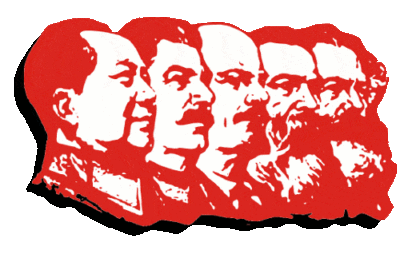 The special characteristic of the proletariat is collective action. When indulging in a political struggle, a class struggle, all our comrades – i.e. starting with the comrade who briefed the struggle by writing a pamphlet, campaigning to the working class by distributing the pamphlet, the one who stick posters, engage in graffiti work, the one who collected donations, the one who mobilized the struggle and the one who led it – play their part. Disparities may exist in the vigour of their work or in their actions. But, it is the collective labour that achieves all this.
The special characteristic of the proletariat is collective action. When indulging in a political struggle, a class struggle, all our comrades – i.e. starting with the comrade who briefed the struggle by writing a pamphlet, campaigning to the working class by distributing the pamphlet, the one who stick posters, engage in graffiti work, the one who collected donations, the one who mobilized the struggle and the one who led it – play their part. Disparities may exist in the vigour of their work or in their actions. But, it is the collective labour that achieves all this.
Look at the industries where the labourers work. They never claim that they created this soap, this vehicle or this computer and such a thought never occur to them. We can see this in the revolutionary struggles; and also in the post-revolutionary construct of socialism.
The specialty and contribution of each of our comrades in this collective movement called party should be recognized. We must make them our own.
Good and bad qualities do exist in all human beings. The human society develops its moral and progresses by inculcating those good qualities. This is normal. Regardless of being a leader or just an ordinary human, we must imbibe their good qualities.
In that way, we imbibe the best communist qualities from the leaders, warriors, cadres and sympathizers of the Naxalbari movement.
We reject the feudal culture of uncritically deifying the dead and the bourgeois-liberal culture of ignoring ones flaws and praising them.
It is because that we refuse to be an accomplice or fall prey to anti-proletarian ideologies and culture, we are being slandered as being orthodoxy and sectarianists. We are concerned only in building a proletarian Bolshevik party and practices and not about opportunistic adventures. Hence, we will never back down fearing the slanders of the prodigies and sages.
The stance of the Communist party and the Communist party-led government of the revolutionary classes
When a proletariat-led New Democratic or Socialist State is established, will those governments follow the stances of the Communist party without any distortion? In practice, it is not possible. The Communist party has the proletarian ideology. But, the Communist Party-led government of the revolutionary classes is not like that. Not only the proletariat, but also the peasants and the petty-bourgeois will also be a part of the government. It is more like a mass organization.
The Communist party can present only the path line and its decisions, but can’t dictate the government to implement it one-hundred percent. It is against democratic centralism. This is why, even if the party has politically-ideologically decided that someone is revisionist-opportunist, these revolutionary people’s governments or soviet governments pay tribute to such persons. The works of them are published. Statues are erected for some. Government institutions or educational institutions are named after them. The proletarian party also respects and recognizes the consciousness of the revolutionary classes.
Russian University of Economics and Saint-Petersburg State Mining Institute were named after Plekhanov, who first introduced Marxism is Russia and fought Narodism and was a great Marxist ideologue. This is how the Soviet government of the day, honoured Plekhanov.
This is how, such people’s governments pay tribute when the leaders of friendly countries die. But the revolutionary people’s governments do not pay tribute or issue obituaries to the leaders of unfriendly hostile imperialist countries and oppressive reactionary countries. We can learn these from the actions of the then Soviet Socialist Russian government and the People’s Democratic Republic of China.
✼ ★ ✼

